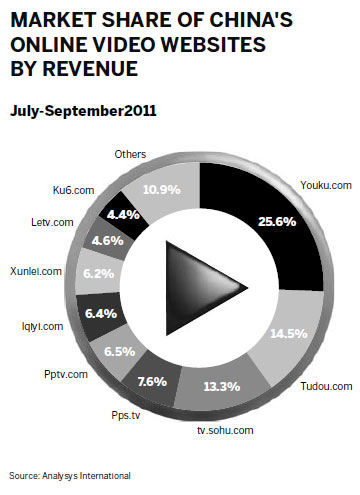Online video sites fight over copyright
Updated: 2012-01-09 10:34
By Chen Limin (China Daily)
|
|||||||||||
BEIJING - For online video websites, the year 2011 didn't end with peace. Copyrights have become the latest battlefield between rivals.
Youku.com Inc, the biggest player by market share, has found itself the subject of bitter accusations from smaller sites.
|
 |
|
Improving the productivity of the culture industry requires better security and protection of copyrights and original producers' interests. However, in the latest development, copyright has become a weapon for online video websites battling rivals for market share. [Photo/China Daily] |
|
 |
Last month, the company was asked for 150 million yuan ($23.8 million) in compensation for copyright infringements by Tudou Holdings Ltd and Tudou's licensed partner, Cti TV. Youku was then successively hit by lawsuits filed by five more companies, including TV Tokyo Corp and Huayi Brothers Media Corp, a movie producer and distributor. Youku responded by saying it has started a "copyright protection move with the largest scale ever" and has launched a lawsuit against Tudou for alleged copyright infringements.
This is the second copyright protection in the online video sector. In 2009, Sohu.com Inc initiated one that helped lead the industry, then flooded with piracy content, to show a greater concern for copyright.
The recent fight is an attempt to stem losses at online video websites where companies have spent a lot more than they earned on copyright purchases, analysts said.
"The purchases of hot TV series and movies cost a lot, and the ones whose copyrights are sold to only one online video website cost even more," said Zhang Fan, an analyst with domestic research company Analysys International.
Charles Zhang, Sohu's chairman and chief executive officer, complained previously that copyright prices had rocketed to an unreasonably high level over the past few years. The price of an episode of a TV series has risen from several thousand yuan a few years ago to as high as 800,000 yuan, he said in July.
To lure more users, major online video companies have poured an increasingly large amount of money into copyrights. Youku, for example, spent 152 million yuan over the past three quarters on content purchases, nearly doubling its total in 2010 of 82.7 million yuan, according to its financial reports.
However, the company hasn't broken even, suffering a net loss of 46.9 million yuan in the third quarter in 2011. This is common among the country's online video companies, whose expenses on copyrights, bandwidth and daily operations have exceeded the revenues they get from advertising.
Victor Koo, Youku's chairman and chief executive officer, said increasing its market share, instead of breaking even, is the focus of the company.
Faced with rising copyright prices for popular TV series and movies, some companies have started to put more emphasis on other kinds of content, such as animation and variety shows, for which prices are relatively cheaper. They also diversify portfolios through this.
Iqiyi.com, the online video arm of search engine Baidu Inc, for example, said animation has become an important part of its content purchases.
Animation is the second largest traffic driver of Iqiyi, coming behind TV series and movies. Animations of more than 400,000 minutes have been bought, said Sarah Zhang, senior director of the business development department.
Xu Weifeng, president of PPStream Inc, an online video service provider, said the company is also increasing the offering of animations even though movie and TV series are still its main focus. Meanwhile, the price of animation is increasing, he added. The price of one minute of animation has risen from eight to 10 yuan to 100 yuan, he said.
Another strategy of major online video websites is to produce their own programs and drama series amid increasingly fierce competition and rising copyright prices.
Tudou, for example, will provide two idol dramas, a variety show section and seven entertainment programs, all of them self-made, in the next three months, said Liu Siming, general manager of Tudou's Original Programming Center in December. The company set up a channel especially for its self-made programs and content for which it owns exclusive copyright. The two elements will form the backbone of Tudou's competitiveness, Liu said.
About 394 million people watch videos online in China last year, compared with the United States' 158 million. The number is expected to reach 445 million this year, according to industry figures.
He Wei contributed to this story.









